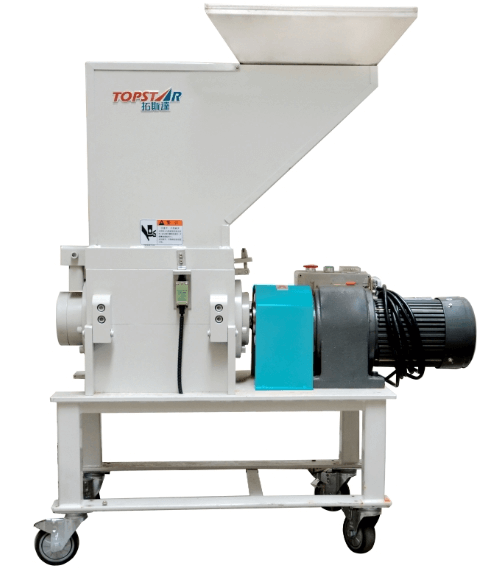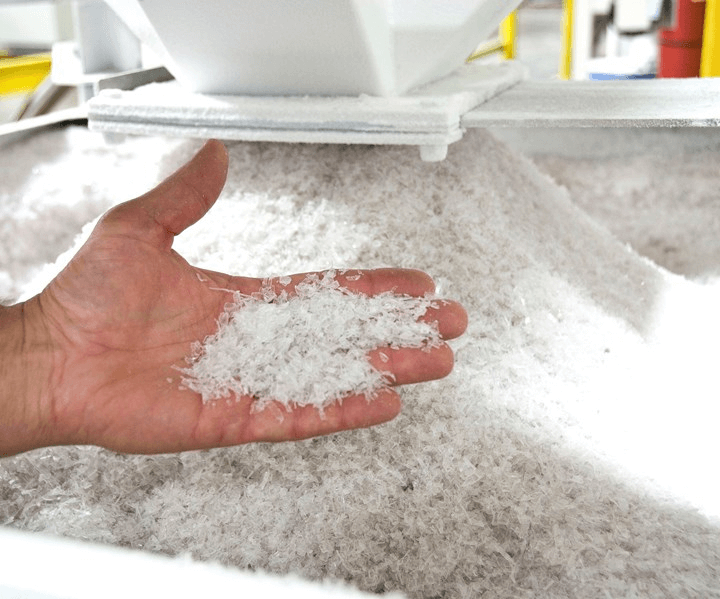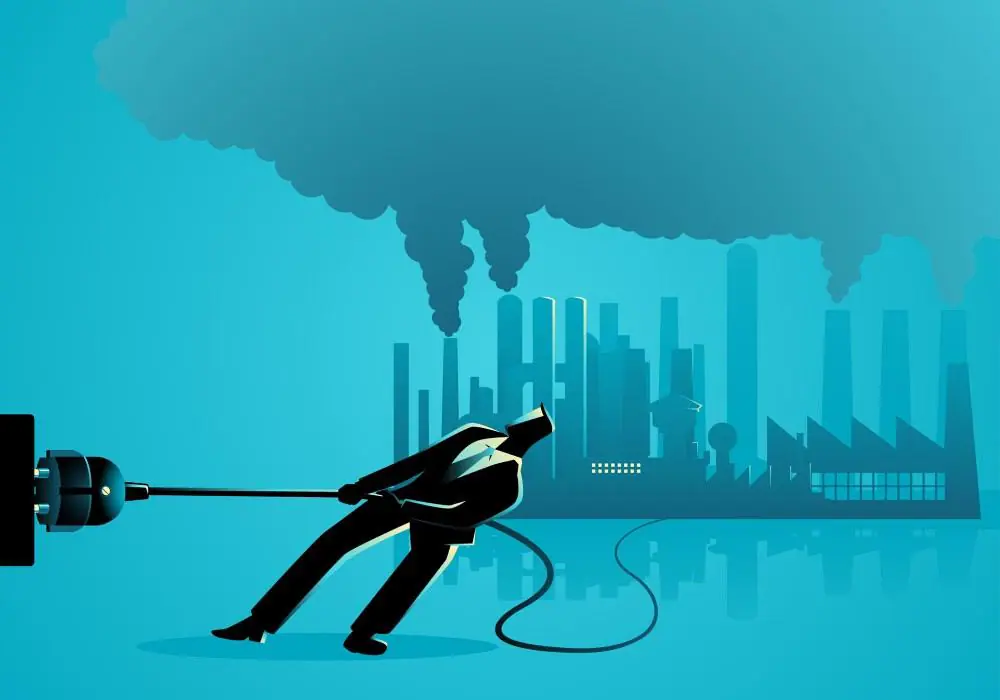The role of Granulating & Recycling System in closed-loop injection molding
2023/11/20 By Topstar

Closed-loop injection molding advocates environmental responsibility and is undergoing a transformation catalyzed by integrating cutting-edge technologies such as granulation and recycling systems. In this guide, we at Topstar delve into the subtle role of the Granulating & Recycling System and examine its far-reaching impact on guiding closed-loop injection molding toward a future that seamlessly blends ecological awareness with economic viability.
The inner working principle of the Granulating & Recycling System
The granulation and recycling system represents the cutting-edge technology of closed-loop injection molding technology. The granulation and recycling system carefully breaks down post-production scrap and defective parts into particles of uniform size. The pellets then undergo a meticulous recycling process in specialized units, converting them into high-quality raw materials. This closed-loop approach goes beyond reducing waste; it embodies a commitment to circular economy principles and demonstrates the industry’s dedication to sustainable practices. Topstar’s granulators have cutting-edge technology to crush plastic waste into consistent granules carefully. The recycling unit uses advanced processes like melt filtration and extrusion for high-quality raw materials.
Material Utilization of Granulating & Recycling Systems
The profound impact of granulation and recycling systems on material utilization is integral to the ethos of closed-loop injection molding. Beyond waste reduction, the system efficiently processes and recycles scrap, reintegrating it into production. This reduces dependence on virgin raw materials and gives plastics manufacturers greater resource efficiency. Economic and environmental benefits are two sides: a fusion of sustainable practices and operational excellence.
Optimization of material utilization is not a separate goal. The Granulating & Recycling System ensures that recycled materials meet or exceed industry standards through meticulous material processing and quality control. Aligning with environmental goals, it preserves final product integrity, ensuring sustainability harmonizes with quality.

Reduce industrial carbon footprint.
The system aligns seamlessly with global sustainability initiatives by diverting materials from landfills and minimizing the need for new raw materials. This conscious effort to mitigate environmental impact echoes the industry’s dedication to responsible manufacturing practices, laying the foundation for a more sustainable future where ecological considerations are paramount.
Reducing the carbon footprint in injection molding is a multifaceted effort that extends beyond the direct production process. Granulating and recycling systems play a vital role in this equation, minimizing the emissions associated with waste disposal and curbing the need for energy-intensive virgin material production. As the industry embraces life cycle thinking, closed-loop models powered by advanced recycling technologies become a beacon for sustainable manufacturing, reducing environmental impact.

Granulating & Recycling Systems maintain material consistency!
Material consistency signifies industry excellence; Granulating and recycling systems lead this commitment to quality. The system meets or exceeds strict quality standards for recycled materials through advanced sorting and processing technology. Impurities are removed, ensuring final product precision rivals those made from original materials. Attention to quality assurance is crucial, especially in areas where product reliability cannot be compromised.
Achieving material consistency in closed-loop injection molding is a multifaceted challenge that requires a comprehensive approach. The system employs sensors, sorting, and real-time monitoring for reliable, quality-controlled recycled materials vital in regulated industries.
Economic advantages of granulation and recovery systems
In addition to the ecological impact, Granulating & Recycling Systems offer manufacturers significant economic advantages in closed-loop injection molding. A significant reduction in reliance on new raw materials translates into tangible cost savings. Upfront costs for system implementation yield strategic, financially sound decisions for forward-thinking injection molding plants in the long term.
The economic advantages of Granulating and recycling Systems extend far beyond immediate balance sheet considerations. In addition to cost savings from reduced raw material purchases, plastics manufacturers gain resiliency in the face of commodity price fluctuations and supply chain uncertainty. The system is a strategic risk mitigator, aligning financial goals with sustainable practices and ensuring a robust, resilient, closed-loop injection molding ecosystem.
Develop a responsible manufacturing plan.
The complexity of closed-loop injection molding, supported by Granulating & Recycling Systems, emphasizes a holistic approach beyond waste reduction. It is committed to resource efficiency, quality assurance, and economic resilience. Integrating advanced technologies into manufacturing processes raises product standards and indicates a more responsible and sustainable industry landscape. If you have any other information you want to know about the granulation and recycling system, please go to our official website to learn more.
TRENDING POSTS
- What factors can cause delays in the injection molding process of plastic molding machine? 2023/11/20
- Exhibition Review| Topstar participates in InterPlas Thailand 2024 2023/11/20
- Star Case | Topstar helps Santong upgrade its intelligent plant 2023/11/20
- Topstar Special | National Science and Technology Workers Day 2023/11/20
HOT TOPIC
- 3 in 1 Compact Dehumidifying Dryer
- 5-axis CNC machine
- accuracy
- Air Chillers
- all electric injection molding machine
- all electric injection molding machines
- All-electric injection molding machines
- and overall production quality. Therefore
- AP-RubberPlas
- automated injection molding machine
- Automation changed engineering
- automation of injection molding robots
- auxiliary machine
- Bench Injection Molding Machine
- Cabinet dryer manufacturers
- Cabinet dryers
- chiller
- CNC Drilling Machine
- CNC Drilling Machines
- cnc engraving machine manufacturer
- cnc laser cutting machine manufacturer
- CNC machine
- CNC Machine Center
- CNC Machine for Sale
- CNC Machine Manufacturing
- CNC Machine Tool
- CNC machine tool product
- CNC Machining Center
- CNC wood carving machine
- Cooling system
- Cross-Walking Single Axis Servo Cylinder Robot
- Cross-Walking Single-Axis Servo Cylinder Robot
- Cross-Walking Three-Axis/Five-Axis Servo Driven Robot
- cross-walking three-axis/five-axis servo-driven robot
- Dehumidifier Dryer
- Dehumidifying Dryer
- delta parallel robot
- Desktop Injection Molding Machine
- Desktop injection molding machines
- Desktop Molding Machine
- desktop plastic injection machine
- Desktop Plastic Injection Molding Machine
- direct clamp injection molding machine
- Direct clamp injection molding machines
- Dosing & mixing system
- Drilling Centers
- Drying and dehumidification system
- drying and dehumidifying equipment
- Drying and Dehumidifying System
- drying system
- effective and efficient. Cabinet dryers are also used in other industries where large quantities of material need to be dried
- efficient injection molding machine
- elbow hydraulic injection molding machines
- electric injection molding machine
- electric injection molding machines
- energy-saving injection molding machine
- etc. Among injection molding robots
- exhibition
- features of CNC machine
- Feeding And Conveying System
- Five Axis Machine Center
- Fully automatic injection molding machine
- Gathering Topstar
- giant injection molding machine
- GMU-600 5-Axis Machining Center
- Granulating & Recycling System
- Heavy duty injection molding machine
- Honeycomb rotor dehumidifier
- horizontal injection molding machine
- Horizontal Injection Molding Machines
- Horizontal Injection Moulding Machine
- Horizontal Mixer manufacturer
- How The CNC Machine Works
- hybrid injection molding machine
- hydraulic injection molding machine
- Hydraulic Injection Molding Machines
- in this article
- Industrial robot
- Industrial Robot Chinese brand
- industrial robot parts
- industrial robot supplier
- Industrial robots
- Industry Chain
- Injection Manipulator
- injection mold machines
- Injection molding
- Injection molding automation
- Injection Molding Automation Solution
- injection molding dryer
- Injection molding equipment
- injection molding hopper dryer
- Injection molding machine
- injection molding machine brand
- Injection Molding Machine Factory
- Injection Molding Machine Manufacture
- Injection molding machine manufacturer
- injection molding machine manufacturers
- Injection molding machine procurement
- injection molding machine robotic arm
- injection molding machine with a robot
- Injection molding machines
- injection molding material dehumidifying
- injection molding plant
- Injection Molding Robot
- injection molding robot arm
- Injection molding robot automation
- Injection molding robotic arm
- injection molding robots
- Injection Moulding Robots
- Injection Robot
- Injection robot arm
- Injection robot manufacturer
- Injection robot wholesale
- injection robots
- intelligent injection molding machines
- Introducing Injection Robot
- It is the best choice for drying large quantities of material at once. Cabinetmakers use these machines because they are fast
- large injection molding machine
- Learn what industrial automation and robotics is
- low speed sound-proof granulator
- machine plastic molding
- make sure to add some! Improvements (2) Keyphrase in introduction: Your keyphrase or its synonyms appear in the first paragraph of the copy
- manipulator machine
- manufacturing
- micro injection molding machine
- middle speed granulator
- Mini CNC machine manufacturers.
- Mold Temperature Control System
- mold temperature controller
- molding material Dehumidifying System
- mould temperature controller
- mould temperature controllers
- New electric injection molding machine
- nitrogen dryer manufacturer
- nitrogen dryer system manufacturer
- Oil type mold temperature controller
- open day
- Outbound links: No outbound links appear in this page. Add some! Images: No images appear on this page. Add some! Internal links: No internal links appear in this page
- PET Preform injection molding
- phone case maker machine
- phone case making machine
- plastic bottle making machine
- plastic bottle manufacturing
- plastic bucket making machine
- plastic bucket manufacturing
- Plastic chair making machine
- plastic forming equipment
- plastic hopper dryer
- plastic injection machine
- plastic injection machines
- plastic injection molding
- Plastic injection molding equipment
- Plastic injection molding machine
- Plastic Injection Molding Machines
- plastic injection robot
- Plastic Molding machine
- Plastic Molding Machines
- plastic molding press
- plastic phone case making machine
- plastic-molding machine
- powerful granulator
- Powerful Type Sound-Proof Granulator
- production of plastic seats
- Robot injection molding
- robot injection molding machine
- robot manufacturing companies
- Robotic arm for injection molding machine
- robotic injection molding machines
- robotics in injection molding
- SCARA robot
- SCARA robots
- Service-oriented manufacturing
- Servo Cylinder Robot
- servo driven robot
- Servo Driven Robots
- servo injection robots
- Servo-Driven Robot
- Setup of injection machine
- Silicone Injection Molding Machine
- six-axis industrial robot
- Stainless Hopper Dryer
- Stainless Hopper Dryers
- star club
- swing arm robot
- the choice between servo-driven robots and hydraulic robots will have a certain impact on efficiency
- the most popular injection molding machine
- the type of injection molding robot
- toggle clamp injection molding machine
- Toggle Hydraulic Injection Molding Machines
- toggle injection molding machine
- Top 10 brands of injection robots
- Topstar
- Topstar Engineering
- Topstar Industrial Robots
- Topstar injection molding intelligent
- Topstar Scara Robots
- Useful Injection molding machine
- Vertical machining centers
- volumetric type blender
- water chiller
- water chillers
- water distributor
- Water Type MoldTemperature Controller
- We often face choices when performing injection molding. We will choose the type of injection molding machine
- wholesale of injection molding machines
- x carve CNC
